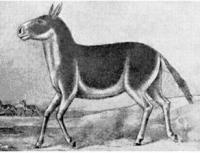Вы здесь
Dziggetai in park Altyn-Emel.

Supervision for dziggetai in park Altyn-Emel.
“Nature is an infinite sphere whose center is everywhere”
Ralph Waldo Emerson.
Bike Travel in Central Asia Kazakhstan.
Kulan (Equus hemionus) is the mammal from the horse class.
They are about 20 thousands in the world and in the CIS they are only in Turkmenistan (Badkhyzhsyi reserve- about 2000).
In Kazakhstan they are only in the Barsakelmes Island (Aral sea) - 200 of them. Kulan dwells in deserts, semi-deserts.
It has features of the donkey (back, big head, long ears) and of the horse (easy move, long-legged).
The body length is 220 - 260cm, the mass 190 - 260 kg. It feeds on plants. It can drinks seawater.
The duration of the pregnancy is about 340 days. Kulan is included in the “Red Book of MCO II”, “Red Book of USSR” and the “Red Book of Kazakhstan”. Eight mammal species of seventy eight are registered in the Red Book of the republic. It is a skewbald putorak, a stone marten, a true otter, manul, dziggetai, jaran and arkhar.
Nevertheless, the “Altyn Emel” National Park can declare with pride that due to effective measures, number of rare animals that are under threat of disappearance is now in safety.
So, in the seventies of the last century 27 Turkmen dziggetais were moved here from island of the Bars-Kelmes in the Aral sea, now in the park there are about two thousand these species.
It would be desirable to hope, that the Turkmen dziggetai that got acclimatized well on our territories under influence of local environment will get external features of the irrevocably lost in thirties congener, Kazakhstan dziggetai.
As to the most beautiful antelopes-jarans today it is possible to see them on the territory of Kazakhstan in large quantities. Today this terrain is the habitat of kulan dzbeyran (steppe, or goitred gazelle), arkhar, lammergeier, short-toed eagle and black stork – to name just a few of the 260 species that survive here.
In theory the park is strictly protected, but unfortunately it is freely used by state authorities for hunting and therefore the survival of several species is in question. Only kulan numbers have greatly increased in the last 20 years, but the reintroduction into the wild of the Przewalski's horse is also proving successful.
Authority:
The guidebook across Kazakhstan . Authors Dagmar Schreiber and Jeremy Tredinnick. Publishing house "Odyssey".2010.
Photos
Alexander Petrov.







